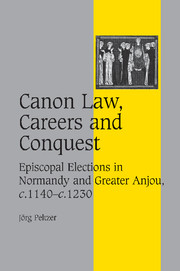Book contents
- Frontmatter
- Contents
- List of maps
- List of tables
- Preface
- Editorial note
- List of abbreviations
- 1 INTRODUCTION
- 2 ELECTORAL THEORY
- 3 ELECTORAL PRACTICE: NORMANDY
- 4 ELECTORAL PRACTICE: GREATER ANJOU
- 5 THE EPISCOPACY IN NORMANDY AND GREATER ANJOU
- 6 THE IMPACT OF THE CAPETIAN CONQUEST OF 1204/6
- 7 CONCLUSION
- APPENDICES
- Bibliography
- Index
- Cambridge Studies in Medieval Life and Thought Fourth Series
7 - CONCLUSION
Published online by Cambridge University Press: 09 August 2009
- Frontmatter
- Contents
- List of maps
- List of tables
- Preface
- Editorial note
- List of abbreviations
- 1 INTRODUCTION
- 2 ELECTORAL THEORY
- 3 ELECTORAL PRACTICE: NORMANDY
- 4 ELECTORAL PRACTICE: GREATER ANJOU
- 5 THE EPISCOPACY IN NORMANDY AND GREATER ANJOU
- 6 THE IMPACT OF THE CAPETIAN CONQUEST OF 1204/6
- 7 CONCLUSION
- APPENDICES
- Bibliography
- Index
- Cambridge Studies in Medieval Life and Thought Fourth Series
Summary
Each election had its own characteristics, its own specific circumstances, in short its own story. For many elections this story can only be reconstructed in part. The parties involved and their motives cannot always be clearly identified; conclusions, therefore, are to a certain extent conjectural. In particular the decisions of individual members of the cathedral chapters and their motives, their alliances, their rivalries, can only be traced in a few cases. In many more, a split election shows that there were rivalries and alliances within the chapter, but we can only guess their origins and their connections with local power structures. In some cases micro-history may provide certain answers, but in others we may never know what actually caused the canons' decisions.
While it is important to emphasise the uniqueness of each decision-making process, it is equally important to recognise that the elections took place within a normative and political framework which provided rules for the electoral procedure and determined the range of groups that could have exercised influence. The development of this framework between 1140 and 1230 can be traced with relative clarity. In Normandy, at the time of Henry I's death in 1135, the commonly accepted legal tradition allowed the clergy of the diocese, in particular the cathedral chapters, and the duke to participate in episcopal elections. The turmoil after Henry's death caused a short-term change. Great barons took the opportunity to influence elections, and some churchmen advocated the Gregorian ideal of elections without any lay interference.
- Type
- Chapter
- Information
- Canon Law, Careers and ConquestEpiscopal Elections in Normandy and Greater Anjou, c.1140–c.1230, pp. 253 - 258Publisher: Cambridge University PressPrint publication year: 2007

